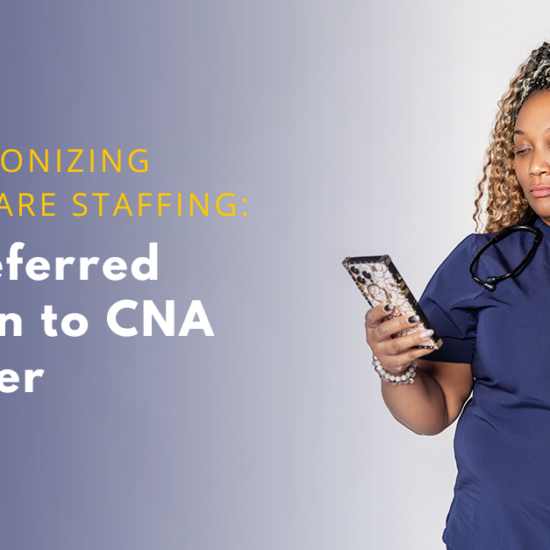How a Recession Could Impact Senior Care: The Good, The Bad & The Silver Lining
How a Recession Could Impact Senior Care: The Good, The Bad & The Silver Lining
As of late, it seems that every time you read the news or scan LinkedIn, another company has laid off a large chunk of its workforce. While this downsizing has largely occurred in tech, many believe it’s a sign that a formal recession is on the horizon. Although economists have been hesitant to declare it, even in the face of persistent inflation, one thing is clear: the market has shifted. Just a few months ago companies were struggling to find workers.
The current situation feels similar to what we experienced at the start of the pandemic, where organizations began letting workers go weeks in to offset expected profit loss. However, unlike other industries such as tourism and retail that take a hit when consumers become conservative, senior care historically fares far better.
Will things pan out in the same way? How will this impact the staffing crisis? No one knows but here are a few things that can safely be assumed based on previous recessions and what skilled nursing and senior living communities can do in the meantime to overcome their biggest challenge of all — staffing.
The Good: How senior care could potentially benefit during a recession
Workers are more likely to stay put
During times of economic uncertainty, people are less prone to job hop, whether that’s to the community down the street, a local hospital or even a restaurant or retailer. No industry is marked safe during a recession and people tend to crave stability when the future is unknown.
“Ironically, recessions historically have been very good for the nursing home industry in terms of workforce because people do not leave their jobs during recessions,” Robyn Stone, senior vice president of research at LeadingAge and director of the LeadingAge LTSS Center at UMass Boston Stone told Skilled Nursing News. “In the 2008 recession, for example, turnover was probably lower than it had been in years and the same thing was true for earlier recessions.”
Although facilities saw higher turnover rates during the recession at the start of the pandemic, when many were scared and burned out, things have settled down since. Therefore, we can assume the outcome will be similar to the 2008 slump.
Needs-based care sectors have historically remained steady
During a recession, most curb spending on nice-to-have items ahead of necessities. Food, shelter, and healthcare take precedence and non-essential item purchases like that new car or home renovation get rain-checked as people nervously funnel any extra cash into their savings.
Sarabeth Hanson, president and CEO of Harbor Retirement Associates (HRA), reflected on the Great Recession to Skilled Nursing News in 2018, “Assisted living and memory care, in particular, should be largely immune to another recession because they are needs-based offerings…Independent living, being more of a ‘luxury buy’ that is often funded by seniors selling their homes, is more likely to take a hit.”
Layoffs in other sectors will expand the labor pool
In the past — most recently during the pandemic — we have seen the unemployment rate climb throughout a recession. As other industries lay off workers, senior care communities should be ready to offer immediate work. Organizations should prepare for an influx of people applying temp jobs or pivoting to pursue a career in the industry, which is largely seen as stable in the face of a recession.
While some might decide to get their nursing aid’s license, others will opt for hourly work in the kitchen, housekeeping and maintenance functions until they can get back on their feet. Regardless of their goals, facilities should do their best to build excellent experiences for these newcomers with the goal of retaining them long-term.
Relief packages could make a comeback
Just as we saw throughout COVID-19, senior care facilities could receive further relief funding from the government, especially as inflation continues to affect the cost of medical supplies and patient care. Not to mention, CMS’s payment reductions for FY 2023 and 2024 only makes the ongoing staffing crisis and occupancy challenges worse. It would be fair to say that industry associations like AHCA/NCAL and LeadingAge will be diligently pushing for federal aid on Capitol Hill.
The Bad: How senior care could potentially suffer during a recession
Increased wage pressure for struggling staff
It’s important to consider that not only will organization’s bottom line suffer during a recession. Senior care workers also experience personal financial hardships. “Inflation is bad for the nursing home workforce because about 60 to 80% of the care received in nursing homes is provided by front-line staff,” Stone told Skilled Nursing News, “[Low wage workers] are going to feel the pinch a lot more which is going to put more pressure on nursing homes.”
And when wages increase, margins are further impacted, something that facilities simply cannot withstand right now. Between hero pay and demand for workers, hourly wages for nurses have already increased by 28 to 34% from 2020 to 2022, according to CliftonLarsonAllen. Further wage increases for frontline workers would be a huge setback.
“Our residents and staff cannot afford another economic blow, such as a recession,” AHCA said in a statement to Skilled Nursing News. “Many facilities are being forced to limit new admissions because of staffing shortages, which hurts our ability to recover. Any additional economic pressures could push more nursing homes over the financial brink.”
Fewer move-ins & shrunken profits
A study from the National Library of Medicine states that during a recession “demand from private-pay residents shifts to the left resulting in fewer private-pay residents and a lower private-pay price.”
As private pay stays decline, more beds will be filled by Medicaid residents, which come at a lower price point. “The fraction of Medicaid residents may increase because more people will qualify for Medicaid as declining wealth makes it easier to meet Medicaid’s asset tests.”
The study continues, “If demand among Medicaid recipients increases or even stays the same, the number of Medicaid residents may increase due to greater availability of beds when private-pay demand declines. Although the ultimate effect on payer mix and the total number of residents is ambiguous, we unambiguously expect lower nursing home revenues during a recession, whether through lower price, more disadvantageous payer mix, or both.”
Unfortunately, due to more availability of informal care from out-of-work family members, we could see fewer Medicaid move-ins, the study explains.
It’s also important to take housing market trends into account. Many seniors must first sell their home before moving into a facility. Unfortunately, high-interest rates make it more difficult for potential homebuyers to get financing. This can lead to reduced demand for homes, which can then drive home prices down and ultimately delay seniors from moving into communities.
The silver lining
It seems that most agree: The positives outweigh the negatives when it comes to how a recession might impact senior care. Robert Applebaum, director of the Ohio Long-Term Care Research Project at Miami University summed up the outlook nicely to Skilled Nursing News. “When unemployment goes up, nursing homes do better on the worker side because they can still get workers. When unemployment is low, like it is right now, they are in a world of hurt.”
In the meantime, communities can prepare by shifting into recruitment mode. Take a look at your organization’s messaging. Is your mission and vision front in center on your careers page and website? Refine your hiring tactics. Are you actively using job boards and social media to get in front of those looking for work? Widen your net by getting your employees involved. Have them share that your community has immediate and rewarding work with their networks and on their social channels. Make sure you have clear career paths and the right perks in place to retain newcomers beyond the recession.
And to keep costs low today and throughout the recession, take advantage of on-demand healthcare marketplaces like NurseDash. Facilities get immediate access to the best staff in the industry at a fraction of the cost of agency workers. And once you’ve identified the perfect fit, you can hire clinicians on full-time without having to pay a fee.






